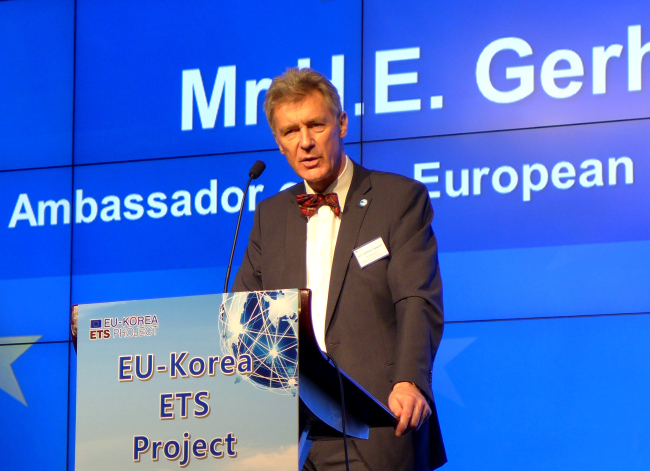The European Union delegation to Korea and Korea’s Ministry of Strategy and Finance will jointly organize a series of programs in emissions trading to help curb greenhouse gas emissions and jump-start the green economy simultaneously.
Officially launched July 8, the three-year scheme shares the EU’s experience and knowledge in operating the emissions trading system -- an innovative approach to reducing greenhouse gas emissions through the trading of emissions credits on the market -- with the Korean government and companies.
Known as “cap and trade,” the system works by a government body allocating or selling a certain number of permits to companies for discharging specified amounts of pollutants within given time periods. Enterprises are required to hold permits equal in amount to their emissions, and those firms that plan to increase emissions are bound to buy additional permits from other firms willing to sell.
 |
European Union Ambassador to Korea Gerhard Sabathil (Joel Lee/The Korea Herald) |
The EU has over 10 years of experience in the government-mandated, market-oriented program that has three main components: technical support, systems simulation and carbon price modeling.
For the Korean government, project activities include field study of EU policies as well as workshops on trading strategies, green technologies and carbon price modeling.
“Climate change is one of the key priorities in our bilateral relationship with the Republic of Korea,” said European Union Ambassador to Korea Gerhard Sabathil. “We have shown that the ETS is a business-friendly means of reducing emissions and stimulating investment in the low-carbon economy. With more than a decade of experience, the EU is well placed to help Korean businesses comply with the ETS.”
Baek Yong-chun, director general of the Ministry of Strategy and Finance, said: “A smooth implementation of the Korean Emissions Trading System requires shared efforts of the Korean government and industry.”
Through the KETS policy, the Korean government will provide incentives to companies investing in renewable energies and energy-saving systems, he added, so that firms can achieve their dual feats of curtailing greenhouse gas emissions and innovating environmentally friendly technologies.
Workshops on emissions verification and trading strategies will enhance corporate trust in the entire initiative, particularly by revving up the low carbon market and raising public-private compatibility, according to Baek.
The first workshop at the Korea Energy Show 2016 at Kintex in Goyang City, Gyeonggi Province on Tuesday was set for new mitigation technologies for greenhouse gases. It featured profitable and sustainable energy solutions and low carbon technologies.
The second workshop will take place in Seoul in January next year on the verification process, intended at strengthening policy compliance. The third workshop in February next year in Seoul will deal with compliance and trading strategies.
Participants interested in workshops next year can register at www.kets-project.eu starting December.
By Joel Lee (
joel@heraldcorp.com)








